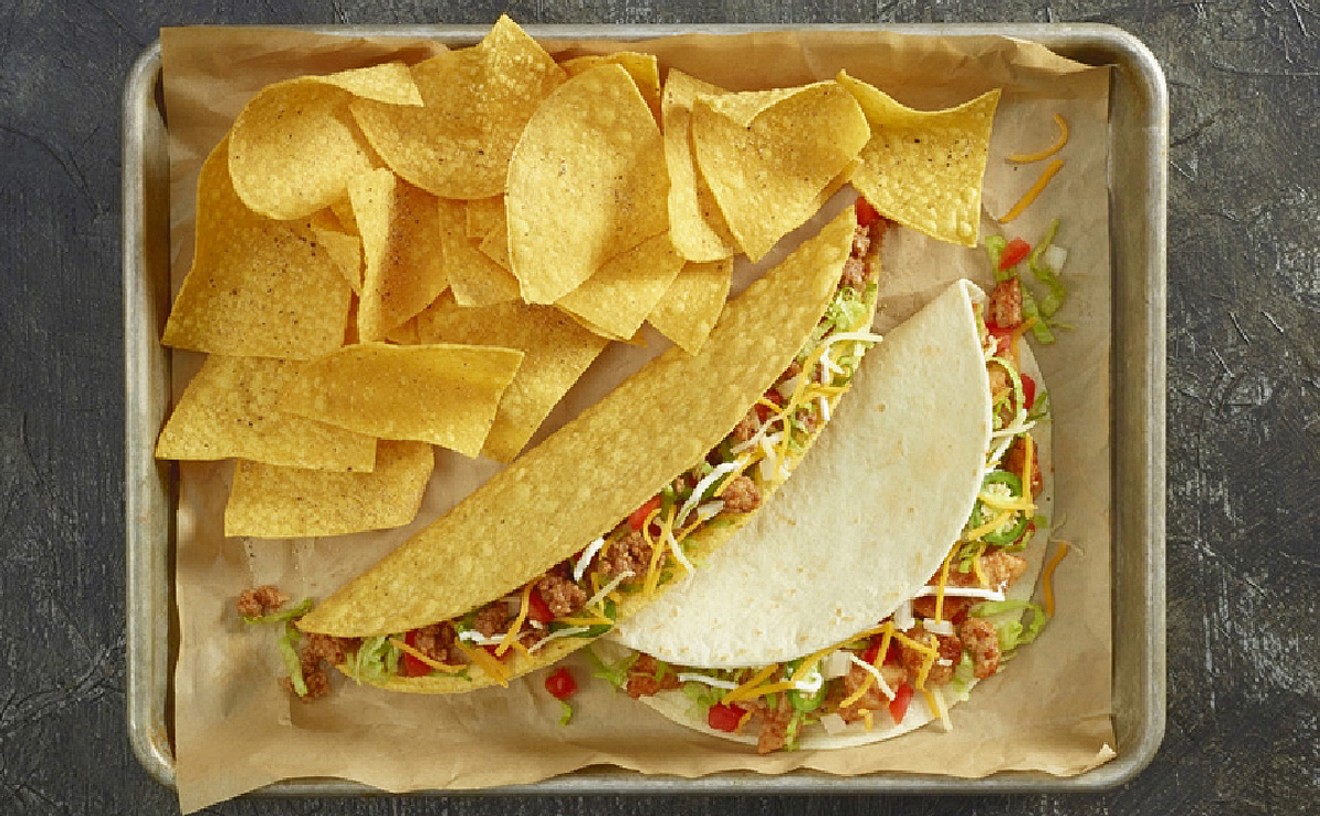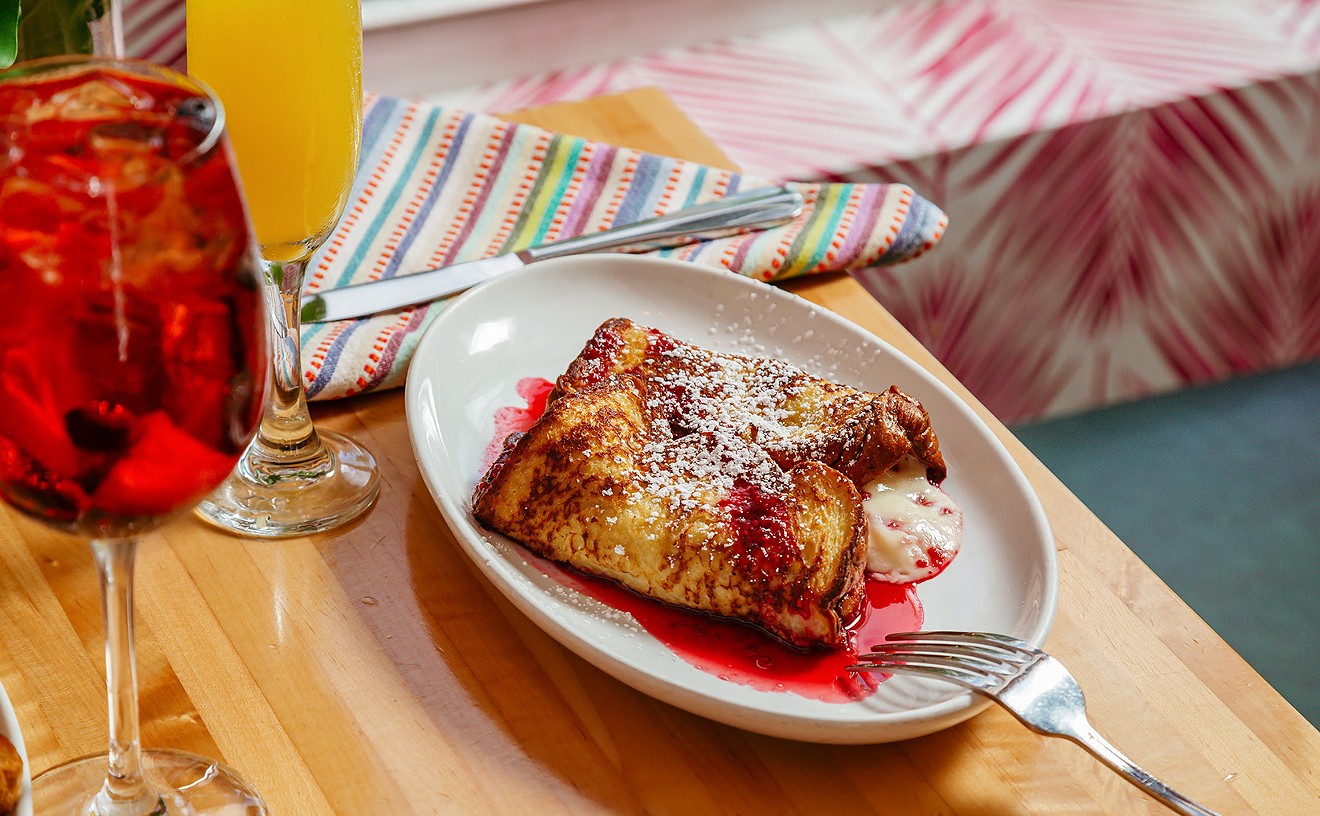The faded-yellow house with windows covered by rusty black bars could be a squat for vagrants or drug addicts. Inside, rooms are stripped down to cinder blocks and wooden beams. After passing through a ragged hole punched into a concrete wall, hundreds of people enter the place, pluck a small white bowl and a spoon, and move on to three dozen slow cookers filled with porridge. Everybody shovels himself a meal and then sprinkles on raisins and brown sugar before digging in.
That was 2010's Just Right, an art installation/meal created by Jennifer Rubell. The idea was to draw similarities between contemporary artists and the story of Goldilocks. It was about "going into the world, trespassing wherever you need to trespass, doing what you need to do, deciding what you want, and getting away with it," the raven-haired, 45-year-old artist said.
Breakfast at the Rubell Family Collection is one of the most engaging, democratic parts of the frothy excitement that envelopes Miami each year during Art Basel. "This is one of the most talked-about events," says Jeffrey Deitch, an art dealer and collector who was director of Los Angeles' Museum of Contemporary Art. "People anticipate it year after year."
The food installations haven't been her only work, but they've become her trademark.
tweet this
Now in their 13th year, the free, open-to-the-public meals have become the linchpin of Jennifer Rubell's artistic career. She was born in 1970 to famed hotel developers Don and Mera Rubell. At the time, the two were already legendary art collectors amassing what would become one of the world's most envied caches of contemporary art. "They met Keith Haring when he was working at the Mudd Club," Jennifer says, referring to the well-known New York artist and the TriBeCa club where he curated work.
Her childhood was spent hopping between galleries and studios in Manhattan's SoHo neighborhood, "even when she was in a stroller," says her mother, Mera. On a random Saturday, they might make as many as a dozen stops.
Yet for Jennifer, food was often more magnetic than art. "I remember really longing for those moments where there would be a break," she says. "Eating was literally the only thing we did other than look at art."
The family frequented a neighborhood pizza place that would fry up the Italian doughnuts called zeppole and cover them in a blizzard of powdered sugar. At age 5, she began handling dull knives. She learned the hospitality industry's intangibles from her uncle Steve Rubell, who turned a nondescript space into the notorious nightclub Studio 54. "The reason it became a magnet for celebrities is that he would make them feel comfortable, at home, special, and normal all at the same time," Jennifer says. By age 9, she was coordinating full meals at her parents' Upper East Side townhouse, where she adorned the table with a flower centerpiece.
Her fascination with eating, dining, and hosting persisted even after she earned a fine arts degree from Harvard. She spent the following year at the Culinary Institute of America in Hyde Park before relocating to Miami to open hotels with her family. In 1993, she began writing food columns for the Miami Herald and the magazine Domino. She also wrote a cookbook, but still found herself limited. "At that time, there was really no way for food and me to exist in the contemplative framework that was very natural for me," she says.
The first projects came in the late 1990s (she didn't begin keeping thorough records until 2006). At a friend's house in New York City, she stacked a table with a mountain of baked potatoes encircled by gluttonous toppings. Her first breakfast, in 2002 — Art Basel Miami Beach's inaugural year — offered a massive pedestal piled with sweet and savory Cuban pastries alongside a never-ending river of café con leche. In the years that followed, each project developed a distinct meaning that would become more personal and abstract as time wore on.
In 2009, she staged Old Fashioned. A 60-foot-wide wall was studded with 1,521 doughnuts hanging on pegs. The name signified the classic pastry and the ever-shifting boundaries of contemporary art. In 2011, while pregnant, she organized the intensely personal installation Incubation. Nursemaids spent 12-hour days in a glass-walled chamber culturing yogurt in small jars. Elizabeth Jones, who now lives in Milan, was working as Rubell's assistant at the time and took an unofficial vow of silence for the five-day project. It became a revealing experiment about food production. "I gained a great appreciation for people who are behind the scenes doing the same thing over and over," says Jones, now 35 years old. Jars full of yogurt were passed through a slot in the glass window to spectators, who would sweeten the creamy concoction by catching drops of honey dripping from the ceiling.
For her 2013 breakfast, Rubell lined up 1,573 Chinese egg custard tarts on a seesaw that teetered as the crayon-yellow rounds were eaten. The installation, called Faith, was a physical manifestation of fertility and the forces that influence it. This year's breakfast, called Devotion, will feature bread, butter, and a soon-to-be-married couple.
"There's always a narrative thread, but it's also about her taking an act of generosity and turning it into artwork," says Zach Rockhill, a sculptor and fabricator who's helped Rubell pull off several breakfasts.
The food installations haven't been her only work, but they've become her trademark. They've earned praise in the media and from collectors and museums for pioneering interactivity. "She's very in the vanguard of understanding that art is changing and expanding and that people want this participatory art," Deitch says.
Yet it's only recently that Rubell has become truly comfortable with her work. For a while, she would admit only to cab drivers that she was an artist. Nearly a decade later, she's contented enough to let go of artistic dogma, like refusing to stage shows with tangible remains. "I definitely have less fear of making something that will radically alter the definition of what I am as an artist or even as an individual," she adds.
In that evolution, she has made a striking impact on the week that surrounds Art Basel. For many, her breakfast is as important as any fair. Yet appreciating it doesn't require an outlandish outfit, a Basquiat in your collection, or a degree in fine arts. If you're looking for aesthetic satisfaction, you won't leave hungry. If you're simply in need of food, then come and eat. The critics are here, but they'll be too busy filling up to beat you down.
Devotion
9 to 11 a.m. Thursday, December 3, at the Rubell Family Collection, 95 NW 29th St., Miami; 305-573-6090; rfc.museum. Admission and breakfast are free.











